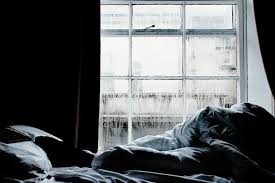
Ideal Temperature and Humidity at Bedroom – Why it is so Important
Do you know that a person spends about a third of his life in a dream? This is a very important process that allows us to restore strength, relax our body and soul, and also recharge our mood the next day. Bad sleep can negatively affect not only mood but also on human health and immunity. Therefore, the situation in the bedroom must be as comfortable as possible. We will give you some tips on what temperature and humidity best suits your body.
Humidity
It has long been proven that air humidity greatly affects our well-being, health, and even emotional state. For example, the air we breathe may be too humid – this will make breathing difficult and cause a big burden on the lungs. Moreover, increased air humidity contributes to the development of fungus, mold, and harmful microorganisms.
At the same time, dry air also stores danger. Because of this, problems such as drying of the nasal mucosa and nasopharynx can occur, especially after sleep. These factors lead not only to discomfort but also to an increased risk of acute respiratory infections. In a dream, we are more vulnerable, so it is best to moisten the air at night or in the evening.
The humidity level in the bedroom and the nursery should be 30–45%, a maximum of 60%. This is the best value for your body and the child’s body. It is also advisable (but not necessary) to sleep with the window open – this is useful. Thus, you get the amount of oxygen your body needs.
However, the “ventilation” of the room can be carried out naturally. Today, during the construction of houses, it became very “fashionable” to worry that it should be built only from “breathing” materials. After all, if moisture is not removed naturally, then the house not only increases humidity, but also mold starts, and the air becomes stale. Therefore, they try to arrange facades with ventilation gaps, to acquire only “breathing” plaster and wallpaper, to opt for high-quality heaters that pass air through themselves, for example, basalt, mineral wool.
Besides, we recommend that you think about the winter period when the batteries often warm so much that they dry the air. Such air can be a reason to dry the mucosa, making it vulnerable to viral diseases. Therefore, doctors recommend using humidifiers during the heating season. There are different models to choose from (from ultra-compact to productive), so for each room (bedroom, nursery, living room), you can choose the right option.
Temperature
 Of course, the comfortable temperature in the bedroom, according to different people, can vary greatly. Someone loves the “hot summer” and freezes if the room is less than 25 degrees. Someone is a “Nordic personality” who loves coolness and winter freshness. But it is worth remembering that there are average values that are useful for your body, well-being, and contribute to healthy sleep.
Of course, the comfortable temperature in the bedroom, according to different people, can vary greatly. Someone loves the “hot summer” and freezes if the room is less than 25 degrees. Someone is a “Nordic personality” who loves coolness and winter freshness. But it is worth remembering that there are average values that are useful for your body, well-being, and contribute to healthy sleep.It is best if the room temperature is about 19–22 degrees, while it is better to sleep at a lower temperature of 17–18 degrees. It is with these indicators that you will not be tormented by headaches and insomnia. Important: if you have small children, then they are more sensitive to temperature differences. Besides, their immunity is not as strong as yours. Therefore, the temperature in the children’s room must be about 20-23 degrees.
Otherwise, there is a risk of running into problems. First of all, the kids suffer. They cannot be super-cooled, because this is fraught with constant colds and diseases. The same goes for too high a temperature. Young children even feel a difference of 2-3 degrees and react very critically to it. So, they become restless, often cry, lose their appetite, and sleep poorly.
For adults, the deviation of temperature from the air also does not bode well. Constant hypothermia often leads to acute respiratory infections. That is, a cough, runny nose, or even pneumonia appears. Also, hypothermia negatively affects the nervous system. Constant stuffiness is also extremely undesirable. Firstly, in a warm room, bacteria begin to multiply, molds appear. After all, such conditions are considered ideal for their life. Secondly, you will constantly feel weak, lethargic, tired.
Creating the Perfect Atmosphere
Well, we know about optimal indicators of humidity and temperature. Now it remains to learn how to create these conditions in your bedroom. This is not so difficult – today you have access to a large number of high-tech assistants.
Air conditioners. In the heat, air conditioning will be an indispensable assistant for everyone. You must admit that it is always pleasant to return home from work, knowing that there you can finally breathe in the cool air. Even if the thermometer reads + 30 ° C. Yes, air conditioners do not clean the air and do not supply clean and fresh air from the street (although some models still support the function of air mixing). Most household split-systems simply cool it and drive it in a circle. However, this is enough to create a comfortable microclimate in the room. And in any. In the living room, where air conditioning is installed, you can comfortably watch TV, chat with other family members. And in the bedroom – read books, relax and, of course, get enough sleep.
Ventilation systems. Also in the heat, domestic fans help a lot. Depending on the model, they can simply chase air around the room (approximately like an air conditioner) or remove it through the ventilation shaft. In the latter case, it is possible to additionally open the windows for ventilation to achieve the optimum temperature, and at the same time to ensure the flow of oxygen. If the budget allows, it makes sense to buy a full supply and exhaust ventilation system. He knows how to remove air, and serve fresh from the street – and even with the windows closed. Thanks to this feature, you can easily achieve the desired temperature and a pleasant microclimate at any time of the year (even in winter, even in summer).
Heating appliances. If your heating is too bad, then it makes sense to think about buying a heating device. For example, an electric convector or a compact fan heater. If the house has a small child, then a portable heater will not be out of place – so that you can put it at the right distance, providing a temperature that is comfortable for the baby. And when he grows up a bit, you can install a “warm floor” in the children’s system. Given that most of the time children spend sitting, crawling, or playing on the floor – it will be useful.
Conclusion
Thanks to our tips, you can create ideal conditions in the bedroom for a comfortable pastime and a pleasant sleep. Ideal humidity and temperature allow you to sleep well. A night of healthy sleep will help improve immunity, get a supply of energy and a good mood for the whole day.
There are many reasons why people don’t get the quantity or the quality sleep that they need. If your sleep problems are a consistent issue, call Alaska Sleep Clinic today @ 907-770-9104 and speak with one of our board-certified sleep specialists. Our free consultation will get you on the right track to improving your sleep and your life.












